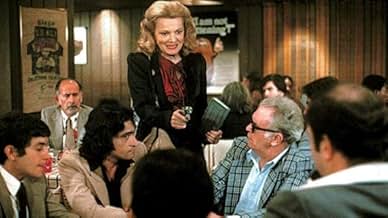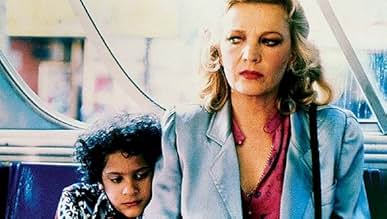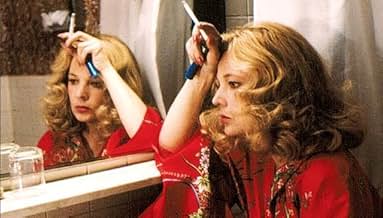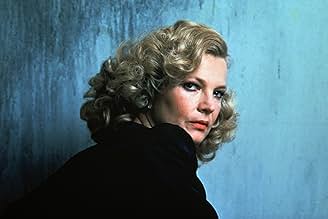IMDb-BEWERTUNG
7,1/10
12.324
IHRE BEWERTUNG
Als die Familie eines Jungen von der Mafia getötet wird, wird die taffe Nachbarin Gloria zu seinem widerwilligen Vormund. Im Besitz eines Buches, das die Gangster haben wollen, gehen die bei... Alles lesenAls die Familie eines Jungen von der Mafia getötet wird, wird die taffe Nachbarin Gloria zu seinem widerwilligen Vormund. Im Besitz eines Buches, das die Gangster haben wollen, gehen die beiden in New York auf die Flucht.Als die Familie eines Jungen von der Mafia getötet wird, wird die taffe Nachbarin Gloria zu seinem widerwilligen Vormund. Im Besitz eines Buches, das die Gangster haben wollen, gehen die beiden in New York auf die Flucht.
- Für 1 Oscar nominiert
- 4 Gewinne & 5 Nominierungen insgesamt
Gary Howard Klar
- Irish Cop
- (as Gary Klar)
Handlung
WUSSTEST DU SCHON:
- WissenswertesActress Gena Rowlands once said of her ex-gun moll character: "When I read the script, I knew I wanted a walk for her. I wanted something that, from the minute you saw me, you knew I could handle myself on the streets of New York. So I started thinking about when I lived in New York, how different I walked down the street when there was nobody but me. It was a walk that said, they'd better watch out".
- PatzerWhen Phil boards the train, the shot has been reversed, as evidenced by backwards lettering on the signs on the train and the platform.
Ausgewählte Rezension
You start with flinty, streetsmart gangster types, cross their paths with a little kid, put them in urban peril, and then you squeeze how things stack up for sentimentality, suspense and humor. It's a charming idea, and perhaps that's why this could be considered John Cassavetes's most conventional film. It tells the story of a gangster's girlfriend who goes on the run with a young boy who is being pursued by the mob for information he doesn't even know he might have. But he wants to tell the story his own way, obstructing every convention we would normally expect, instilling a realist perspective in how we follow the movie, making the pay-off that much more worthwhile. Cassavetes didn't intend to direct his script. He just wanted to sell the story to Columbia Pictures. But once his wife Gena Rowlands was asked to play Gloria, she obliged Cassavetes to direct it.
This underdog crime drama is particularly absorbing in its first hour, and ignites with a great beginning. We follow one character, it leads to another character, perspectives are interknit, the situation builds and Cassavetes has complete control over what we know and expect, all in spite of the all-too-familiar premise, which is then set for the rest of the movie, which is a cat-and-mouse hunt per the seedier locales of New York and New Jersey. He makes the threat so real that when the two key characters evade tangible danger, we still feel the tension whenever they round a corner, get in and out of cabs, and other such ordinary actions. He doesn't let on that unwanted company is present. It just happens. There is one scene that lasts for quite awhile before we realize, after Rowlands's title character does, that unwanted company has been there the entire time.
In an Oscar-nominated performance, Rowlands is expectedly the beautiful lead actress, but she sports a kind of masculine quality, creating a much more dense dynamic when she, afraid of her maternal instincts, finds them overpowering her lifelong self-preservation, and begrudgingly protects the boy. As the film progresses, however, she becomes more sincere in her protection, and integrates her love with her seasoned familiarity with how to stay alive in this town. In one creative take on the Fine, I Don't Need You Anyway scene, she asks a bartender, "There's reasons I can't turn and just look, but is there a little kid headed in here or across the street or whatever?" She drives her role with such honest irritable liveliness. Yet the kid is also well cast. He was a conspicuous little boy named John Adames with dark hair, big eyes and a way of trucking his dialogue as if confronting you to adjust a single word. It all works because everything about his character, the way he dresses, talks, revolts and moves, serves the naive notion that he is older, smarter and cooler than he is.
Cassavetes has a natural keenness for guilelessly unadorned location shooting in that he never plans, stages, waits on the weather or time of day, or hires extras or stunt drivers. Note how passers-by in the distance will often look on at the characters, whether Gloria has pulled a gun in a public place or not. Wherever the characters need to be, that place is in real time, as dirty, scuzzy and purely of the film's era as it would've normally been. There's a shabby flophouse where the clerk tells Gloria, "Just pick a room. They're all open." There are bus stations, back alleys, dimly lit hallways, and bars that open at dawn. And his occasional action scenes are so thrilling because of their surprise.
For once, Cassavetes doesn't stage indefinitely extensive scenes of dialogue wherein the actors indulge in their own view of their characters' unraveling. But I miss that. As I've already said, I am very impressed with how tightly he mounts suspense from the very beginning, how Gloria and the kid zip from cab to bus to cab to street to hotel to cab and so on. But regardless of how doggedly realistic he is in his portrayal of a recycled movie plot, he still relies upon that plot rather than the impositions of his characters flexing their wings.
This underdog crime drama is particularly absorbing in its first hour, and ignites with a great beginning. We follow one character, it leads to another character, perspectives are interknit, the situation builds and Cassavetes has complete control over what we know and expect, all in spite of the all-too-familiar premise, which is then set for the rest of the movie, which is a cat-and-mouse hunt per the seedier locales of New York and New Jersey. He makes the threat so real that when the two key characters evade tangible danger, we still feel the tension whenever they round a corner, get in and out of cabs, and other such ordinary actions. He doesn't let on that unwanted company is present. It just happens. There is one scene that lasts for quite awhile before we realize, after Rowlands's title character does, that unwanted company has been there the entire time.
In an Oscar-nominated performance, Rowlands is expectedly the beautiful lead actress, but she sports a kind of masculine quality, creating a much more dense dynamic when she, afraid of her maternal instincts, finds them overpowering her lifelong self-preservation, and begrudgingly protects the boy. As the film progresses, however, she becomes more sincere in her protection, and integrates her love with her seasoned familiarity with how to stay alive in this town. In one creative take on the Fine, I Don't Need You Anyway scene, she asks a bartender, "There's reasons I can't turn and just look, but is there a little kid headed in here or across the street or whatever?" She drives her role with such honest irritable liveliness. Yet the kid is also well cast. He was a conspicuous little boy named John Adames with dark hair, big eyes and a way of trucking his dialogue as if confronting you to adjust a single word. It all works because everything about his character, the way he dresses, talks, revolts and moves, serves the naive notion that he is older, smarter and cooler than he is.
Cassavetes has a natural keenness for guilelessly unadorned location shooting in that he never plans, stages, waits on the weather or time of day, or hires extras or stunt drivers. Note how passers-by in the distance will often look on at the characters, whether Gloria has pulled a gun in a public place or not. Wherever the characters need to be, that place is in real time, as dirty, scuzzy and purely of the film's era as it would've normally been. There's a shabby flophouse where the clerk tells Gloria, "Just pick a room. They're all open." There are bus stations, back alleys, dimly lit hallways, and bars that open at dawn. And his occasional action scenes are so thrilling because of their surprise.
For once, Cassavetes doesn't stage indefinitely extensive scenes of dialogue wherein the actors indulge in their own view of their characters' unraveling. But I miss that. As I've already said, I am very impressed with how tightly he mounts suspense from the very beginning, how Gloria and the kid zip from cab to bus to cab to street to hotel to cab and so on. But regardless of how doggedly realistic he is in his portrayal of a recycled movie plot, he still relies upon that plot rather than the impositions of his characters flexing their wings.
Top-Auswahl
Melde dich zum Bewerten an und greife auf die Watchlist für personalisierte Empfehlungen zu.
- How long is Gloria?Powered by Alexa
Details
- Erscheinungsdatum
- Herkunftsland
- Offizielle Standorte
- Sprache
- Auch bekannt als
- One Summer Night
- Drehorte
- Trinity Church Cemetery - 770 Riverside Drive, Manhattan, New York City, New York, USA(ending scene at Pittsburgh cemetery)
- Produktionsfirma
- Weitere beteiligte Unternehmen bei IMDbPro anzeigen
Box Office
- Bruttoertrag in den USA und Kanada
- 4.059.673 $
- Eröffnungswochenende in den USA und in Kanada
- 33.767 $
- 5. Okt. 1980
- Weltweiter Bruttoertrag
- 4.062.212 $
Zu dieser Seite beitragen
Bearbeitung vorschlagen oder fehlenden Inhalt hinzufügen































